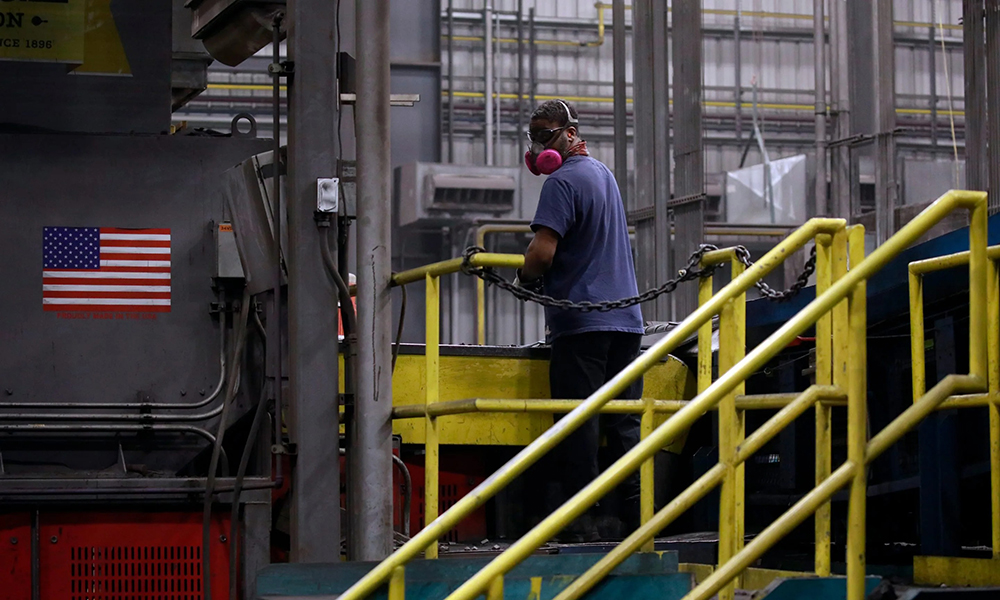
我們都看過(guò)小鎮(zhèn)關(guān)閉最后一座工廠然后徹底沉淪的景象。小鎮(zhèn)主干道兩側(cè)到處都是閑置的店鋪,,有能力的年輕人都會(huì)前往其他地區(qū)尋找更好的發(fā)展機(jī)會(huì),。雖然美國(guó)有一些社區(qū)確實(shí)是這幅景象,但還有一些社區(qū)打破了這種模式,。
事實(shí)上,所謂制造業(yè)消失的說(shuō)法被嚴(yán)重夸大,。
工業(yè)就業(yè)崗位從2011年1月的1,160萬(wàn)個(gè),,增加到2021年10月的1,250萬(wàn)個(gè),而且美國(guó)有數(shù)以百計(jì)的制造企業(yè)生產(chǎn)世界一流的產(chǎn)品,,并實(shí)現(xiàn)了出色的財(cái)務(wù)業(yè)績(jī),。這些企業(yè)組成了所謂的“鈦經(jīng)濟(jì)”(指非面向消費(fèi)者的工業(yè)品制造企業(yè)),他們的業(yè)績(jī)可能對(duì)于美國(guó)實(shí)現(xiàn)迫切需要的可持續(xù)和包容性增長(zhǎng)至關(guān)重要,。
鈦經(jīng)濟(jì)的存在是顯而易見(jiàn)的,,只是一直沒(méi)有被發(fā)現(xiàn)。許多企業(yè)遠(yuǎn)離主要媒體市場(chǎng),,但他們生產(chǎn)的產(chǎn)品卻非常重要,,例如起重設(shè)備或石油再精煉等。這些企業(yè)的中位數(shù)年薪為63,000美元,,而服務(wù)業(yè)的中位數(shù)年薪為30,000美元,,而且這些企業(yè)的許多從業(yè)者并沒(méi)有四年學(xué)位。
許多企業(yè)就在創(chuàng)始人的家鄉(xiāng),。
預(yù)計(jì)有688家鈦經(jīng)濟(jì)企業(yè)為上市公司,,為私營(yíng)企業(yè)的五分之一。他們?cè)趧?chuàng)造價(jià)值時(shí),,所考慮的是實(shí)體經(jīng)濟(jì)而不是金融,。對(duì)這些企業(yè)開(kāi)展的一系列全國(guó)性研究發(fā)現(xiàn)的最有趣的事情之一是,鈦經(jīng)濟(jì)所覆蓋的地區(qū)似乎通常是很適宜居住的城鎮(zhèn),。
如果你想象出來(lái)的景象是一家古樸的工作室,,雇傭了許多頭發(fā)斑白的工人,周一還會(huì)供應(yīng)松餅,,那就重新想一想,。約80%上市鈦經(jīng)濟(jì)企業(yè)為中小盤(pán)股,其銷(xiāo)售額從10億美元到100億美元不等,,員工人數(shù)在2,000人至20,000人之間,。380家最大的私營(yíng)鈦經(jīng)濟(jì)企業(yè)年收入總計(jì)約為2,500億美元,。
這些企業(yè)的一個(gè)特征是,他們擅長(zhǎng)以創(chuàng)新驅(qū)動(dòng)有機(jī)增長(zhǎng),。因此,,他們通常都是微觀垂直領(lǐng)域的引領(lǐng)者。他們所在的專業(yè)領(lǐng)域有10至15家企業(yè)組成,。由于市場(chǎng)較小,,企業(yè)能非常細(xì)致地了解市場(chǎng)和客戶。
以佛羅里達(dá)州新里奇港的Welbilt為例,。該公司是工業(yè)廚房設(shè)備市場(chǎng)的主要企業(yè),,該市場(chǎng)的規(guī)模高達(dá)800億美元。Welbilt很清楚,,餐廳和其他大型廚房需要花費(fèi)大量時(shí)間監(jiān)控每臺(tái)設(shè)備的溫度,。因此,經(jīng)過(guò)三年的努力,,該公司推出了一款創(chuàng)新技術(shù),,除了行業(yè)期刊以外,它并沒(méi)有引起其他媒體關(guān)注,。該公司開(kāi)發(fā)了一種通用控制器和用戶界面,,可用于所有Welbilt設(shè)備。該技術(shù)能夠提高生產(chǎn)效率,、可靠性,、質(zhì)量和安全性,同時(shí)改善公司業(yè)績(jī),。
這件事本身很有趣,,但它的意義不止于此:鈦經(jīng)濟(jì)企業(yè)成功所產(chǎn)生的積極影響,可能并不局限于他們自己的業(yè)績(jī),。他們的強(qiáng)大意味著他們可以成為相關(guān)行業(yè)的中心,,吸引人才和投資,然后吸引更多企業(yè)進(jìn)入該領(lǐng)域,,這就是我們所說(shuō)的“大幅擴(kuò)增循環(huán)”,。
南卡羅萊納州辛普森維爾的紡織業(yè)衰退之后,能吸引一家米其林(Michelin)工廠都感到非常激動(dòng),。隨后有汽車(chē)廠商到當(dāng)?shù)赝顿Y,,然后各種關(guān)聯(lián)行業(yè)落戶該地,例如倉(cāng)儲(chǔ)和商業(yè)清潔等,。
但這要?dú)w功于最初取得成功的希悅爾公司(Sealed Air),。這家鈦經(jīng)濟(jì)企業(yè)成立于1955年,以生產(chǎn)氣泡紙而著稱。該公司成為當(dāng)?shù)厣鐓^(qū)的重要支柱,,其成功也是向其他工業(yè)企業(yè)證明辛普森維爾的潛力的樣板,。政府也發(fā)揮了核心作用。當(dāng)?shù)卣疇I(yíng)造了友好的營(yíng)商環(huán)境,,并與高中,、大學(xué)和其他機(jī)構(gòu)合作,建立和更新人才庫(kù),。
美國(guó)鈦經(jīng)濟(jì)所存在的一個(gè)問(wèn)題是:我們需要更多鈦經(jīng)濟(jì)企業(yè),。隨著全世界機(jī)票、保險(xiǎn)和人工成本大幅上漲,,大力發(fā)展國(guó)內(nèi)制造業(yè)有強(qiáng)大的經(jīng)濟(jì)理由,。正如我們?cè)谛鹿谝咔槠陂g所看到的那樣,重要需求從國(guó)內(nèi)得不到滿足有許多負(fù)面影響,。
然而,,鈦經(jīng)濟(jì)中心不會(huì)一蹴而就,他們需要經(jīng)過(guò)逐步培養(yǎng),。在美國(guó),公共和私人領(lǐng)域以及學(xué)術(shù)界的領(lǐng)導(dǎo)者大有可為,。
鈦經(jīng)濟(jì)企業(yè)的估值偏低,,而且進(jìn)入工業(yè)技術(shù)領(lǐng)域的風(fēng)險(xiǎn)資本不超過(guò)百分之一。公共部門(mén)對(duì)鈦經(jīng)濟(jì)企業(yè)的支持也有限,,尤其是與中國(guó)和德國(guó)等主要競(jìng)爭(zhēng)對(duì)手相比,。另外一點(diǎn)是觀念上的挑戰(zhàn):對(duì)四年大學(xué)學(xué)位的看重,會(huì)嚴(yán)重低估制造業(yè)可以給人們帶來(lái)的可能性,。制造業(yè)可以為人們帶來(lái)良好的發(fā)展機(jī)會(huì),。
人們可以為發(fā)展鈦經(jīng)濟(jì)采取更多措施,并且迫在眉睫,。經(jīng)過(guò)良好的發(fā)展,,美國(guó)可能出現(xiàn)越來(lái)越多鈦經(jīng)濟(jì)中心,有望在每個(gè)地區(qū)形成創(chuàng)新和繁榮的良性循環(huán),。
發(fā)展鈦經(jīng)濟(jì)沒(méi)有必要采取強(qiáng)硬手段,。投資者可以根據(jù)自己的標(biāo)準(zhǔn)評(píng)估工業(yè)技術(shù)。學(xué)??梢宰寣W(xué)生了解制造業(yè)崗位,,鼓勵(lì)女生考慮進(jìn)入這些行業(yè)。工會(huì)可以擴(kuò)大學(xué)徒制,。行業(yè)組織可以開(kāi)發(fā)全國(guó)認(rèn)可的,、可轉(zhuǎn)讓的證書(shū)。州和國(guó)家政府可以考慮扶持發(fā)展工業(yè)4.0,尤其是在經(jīng)濟(jì)落后的區(qū)域,。
鈦經(jīng)濟(jì)是一個(gè)被隱藏的寶藏,,它的存在顛覆了人們對(duì)于美國(guó)制造業(yè)的傳統(tǒng)認(rèn)知。繼續(xù)擴(kuò)大鈦經(jīng)濟(jì)的優(yōu)勢(shì),,能夠提高效率和韌性,,提升企業(yè)的競(jìng)爭(zhēng)力。(財(cái)富中文網(wǎng))
本文作者阿蘇托什·帕蒂為麥肯錫公司(McKinsey & Company)北美主理合伙人和《鈦經(jīng)濟(jì):工業(yè)技術(shù)如何讓美國(guó)更美好,、更快速,、更強(qiáng)大》(The Titanium Economy: How Industrial Technology Can Create a Better, Faster, Stronger America)一書(shū)的作者之一。
譯者:劉進(jìn)龍
審校:汪皓
我們都看過(guò)小鎮(zhèn)關(guān)閉最后一座工廠然后徹底沉淪的景象,。小鎮(zhèn)主干道兩側(cè)到處都是閑置的店鋪,,有能力的年輕人都會(huì)前往其他地區(qū)尋找更好的發(fā)展機(jī)會(huì)。雖然美國(guó)有一些社區(qū)確實(shí)是這幅景象,,但還有一些社區(qū)打破了這種模式,。
事實(shí)上,所謂制造業(yè)消失的說(shuō)法被嚴(yán)重夸大,。
工業(yè)就業(yè)崗位從2011年1月的1,160萬(wàn)個(gè),,增加到2021年10月的1,250萬(wàn)個(gè),而且美國(guó)有數(shù)以百計(jì)的制造企業(yè)生產(chǎn)世界一流的產(chǎn)品,,并實(shí)現(xiàn)了出色的財(cái)務(wù)業(yè)績(jī),。這些企業(yè)組成了所謂的“鈦經(jīng)濟(jì)”(指非面向消費(fèi)者的工業(yè)品制造企業(yè)),他們的業(yè)績(jī)可能對(duì)于美國(guó)實(shí)現(xiàn)迫切需要的可持續(xù)和包容性增長(zhǎng)至關(guān)重要,。
鈦經(jīng)濟(jì)的存在是顯而易見(jiàn)的,,只是一直沒(méi)有被發(fā)現(xiàn)。許多企業(yè)遠(yuǎn)離主要媒體市場(chǎng),,但他們生產(chǎn)的產(chǎn)品卻非常重要,,例如起重設(shè)備或石油再精煉等。這些企業(yè)的中位數(shù)年薪為63,000美元,,而服務(wù)業(yè)的中位數(shù)年薪為30,000美元,,而且這些企業(yè)的許多從業(yè)者并沒(méi)有四年學(xué)位。
許多企業(yè)就在創(chuàng)始人的家鄉(xiāng),。
預(yù)計(jì)有688家鈦經(jīng)濟(jì)企業(yè)為上市公司,,為私營(yíng)企業(yè)的五分之一。他們?cè)趧?chuàng)造價(jià)值時(shí),,所考慮的是實(shí)體經(jīng)濟(jì)而不是金融,。對(duì)這些企業(yè)開(kāi)展的一系列全國(guó)性研究發(fā)現(xiàn)的最有趣的事情之一是,鈦經(jīng)濟(jì)所覆蓋的地區(qū)似乎通常是很適宜居住的城鎮(zhèn),。
如果你想象出來(lái)的景象是一家古樸的工作室,,雇傭了許多頭發(fā)斑白的工人,,周一還會(huì)供應(yīng)松餅,那就重新想一想,。約80%上市鈦經(jīng)濟(jì)企業(yè)為中小盤(pán)股,,其銷(xiāo)售額從10億美元到100億美元不等,員工人數(shù)在2,000人至20,000人之間,。380家最大的私營(yíng)鈦經(jīng)濟(jì)企業(yè)年收入總計(jì)約為2,500億美元,。
這些企業(yè)的一個(gè)特征是,他們擅長(zhǎng)以創(chuàng)新驅(qū)動(dòng)有機(jī)增長(zhǎng),。因此,,他們通常都是微觀垂直領(lǐng)域的引領(lǐng)者。他們所在的專業(yè)領(lǐng)域有10至15家企業(yè)組成,。由于市場(chǎng)較小,,企業(yè)能非常細(xì)致地了解市場(chǎng)和客戶。
以佛羅里達(dá)州新里奇港的Welbilt為例,。該公司是工業(yè)廚房設(shè)備市場(chǎng)的主要企業(yè),,該市場(chǎng)的規(guī)模高達(dá)800億美元。Welbilt很清楚,,餐廳和其他大型廚房需要花費(fèi)大量時(shí)間監(jiān)控每臺(tái)設(shè)備的溫度,。因此,經(jīng)過(guò)三年的努力,,該公司推出了一款創(chuàng)新技術(shù),,除了行業(yè)期刊以外,它并沒(méi)有引起其他媒體關(guān)注,。該公司開(kāi)發(fā)了一種通用控制器和用戶界面,可用于所有Welbilt設(shè)備,。該技術(shù)能夠提高生產(chǎn)效率,、可靠性、質(zhì)量和安全性,,同時(shí)改善公司業(yè)績(jī),。
這件事本身很有趣,但它的意義不止于此:鈦經(jīng)濟(jì)企業(yè)成功所產(chǎn)生的積極影響,,可能并不局限于他們自己的業(yè)績(jī),。他們的強(qiáng)大意味著他們可以成為相關(guān)行業(yè)的中心,吸引人才和投資,,然后吸引更多企業(yè)進(jìn)入該領(lǐng)域,,這就是我們所說(shuō)的“大幅擴(kuò)增循環(huán)”。
南卡羅萊納州辛普森維爾的紡織業(yè)衰退之后,,能吸引一家米其林(Michelin)工廠都感到非常激動(dòng),。隨后有汽車(chē)廠商到當(dāng)?shù)赝顿Y,,然后各種關(guān)聯(lián)行業(yè)落戶該地,例如倉(cāng)儲(chǔ)和商業(yè)清潔等,。
但這要?dú)w功于最初取得成功的希悅爾公司(Sealed Air),。這家鈦經(jīng)濟(jì)企業(yè)成立于1955年,以生產(chǎn)氣泡紙而著稱,。該公司成為當(dāng)?shù)厣鐓^(qū)的重要支柱,,其成功也是向其他工業(yè)企業(yè)證明辛普森維爾的潛力的樣板。政府也發(fā)揮了核心作用,。當(dāng)?shù)卣疇I(yíng)造了友好的營(yíng)商環(huán)境,,并與高中、大學(xué)和其他機(jī)構(gòu)合作,,建立和更新人才庫(kù),。
美國(guó)鈦經(jīng)濟(jì)所存在的一個(gè)問(wèn)題是:我們需要更多鈦經(jīng)濟(jì)企業(yè)。隨著全世界機(jī)票,、保險(xiǎn)和人工成本大幅上漲,,大力發(fā)展國(guó)內(nèi)制造業(yè)有強(qiáng)大的經(jīng)濟(jì)理由。正如我們?cè)谛鹿谝咔槠陂g所看到的那樣,,重要需求從國(guó)內(nèi)得不到滿足有許多負(fù)面影響,。
然而,鈦經(jīng)濟(jì)中心不會(huì)一蹴而就,,他們需要經(jīng)過(guò)逐步培養(yǎng),。在美國(guó),公共和私人領(lǐng)域以及學(xué)術(shù)界的領(lǐng)導(dǎo)者大有可為,。
鈦經(jīng)濟(jì)企業(yè)的估值偏低,,而且進(jìn)入工業(yè)技術(shù)領(lǐng)域的風(fēng)險(xiǎn)資本不超過(guò)百分之一。公共部門(mén)對(duì)鈦經(jīng)濟(jì)企業(yè)的支持也有限,,尤其是與中國(guó)和德國(guó)等主要競(jìng)爭(zhēng)對(duì)手相比,。另外一點(diǎn)是觀念上的挑戰(zhàn):對(duì)四年大學(xué)學(xué)位的看重,會(huì)嚴(yán)重低估制造業(yè)可以給人們帶來(lái)的可能性,。制造業(yè)可以為人們帶來(lái)良好的發(fā)展機(jī)會(huì),。
人們可以為發(fā)展鈦經(jīng)濟(jì)采取更多措施,并且迫在眉睫,。經(jīng)過(guò)良好的發(fā)展,,美國(guó)可能出現(xiàn)越來(lái)越多鈦經(jīng)濟(jì)中心,有望在每個(gè)地區(qū)形成創(chuàng)新和繁榮的良性循環(huán),。
發(fā)展鈦經(jīng)濟(jì)沒(méi)有必要采取強(qiáng)硬手段,。投資者可以根據(jù)自己的標(biāo)準(zhǔn)評(píng)估工業(yè)技術(shù)。學(xué)??梢宰寣W(xué)生了解制造業(yè)崗位,,鼓勵(lì)女生考慮進(jìn)入這些行業(yè),。工會(huì)可以擴(kuò)大學(xué)徒制。行業(yè)組織可以開(kāi)發(fā)全國(guó)認(rèn)可的,、可轉(zhuǎn)讓的證書(shū),。州和國(guó)家政府可以考慮扶持發(fā)展工業(yè)4.0,尤其是在經(jīng)濟(jì)落后的區(qū)域,。
鈦經(jīng)濟(jì)是一個(gè)被隱藏的寶藏,,它的存在顛覆了人們對(duì)于美國(guó)制造業(yè)的傳統(tǒng)認(rèn)知。繼續(xù)擴(kuò)大鈦經(jīng)濟(jì)的優(yōu)勢(shì),,能夠提高效率和韌性,,提升企業(yè)的競(jìng)爭(zhēng)力。(財(cái)富中文網(wǎng))
本文作者阿蘇托什·帕蒂為麥肯錫公司(McKinsey & Company)北美主理合伙人和《鈦經(jīng)濟(jì):工業(yè)技術(shù)如何讓美國(guó)更美好,、更快速,、更強(qiáng)大》(The Titanium Economy: How Industrial Technology Can Create a Better, Faster, Stronger America)一書(shū)的作者之一。
譯者:劉進(jìn)龍
審校:汪皓
We’ve all seen pictures of small towns that lost their last factory and never recovered. Their Main Streets are pockmarked with vacant storefronts and the young leave as soon as they can in search of better opportunities. While there are communities across America that can be described this way, there are also many that break this mold.
Indeed, the death of manufacturing has been greatly exaggerated.
Industrial employment rose from 11.6 million jobs in January 2011 to 12.5 million in October 2021, and the United States is home to hundreds of manufacturers that deliver world-class products and excellent financial returns. Collectively, these companies make up the “Titanium Economy”–and their performance could be critical to driving the sustainable and inclusive growth our country needs.
The Titanium Economy is hidden in plain sight. Many of these companies are based far from major media markets, and they do important things like manufacturing lifting equipment or re-refining oil. Median annual pay is $63,000, compared to $30,000 for service jobs–and many of these jobs go to those without four-year degrees.
Many, too, are embedded in the hometowns of their founders and families.
An estimated 688 Titanium Economy companies are public–a fifth of the number of private ones. When they create value, it’s with Main Street, not just Wall Street, in mind. One of the most interesting things that stemmed from a set of nationwide research on these companies was that Titanium Economy hometowns often seem like great places to live.
If this conjures up images of a quaint workshop with a few grizzled workers and muffins on Monday, think again. About 80% of public Titanium Economy companies are small to mid-cap, with sales ranging from $1 billion to $10 billion and a headcount of 2,000 to 20,000 employees. The 380 largest privately-owned Titanium Economy companies have a combined annual revenue of about $250 billion.
One feature of this group is that they excel at innovation-driven organic growth. That is because they are often leading players in “micro-verticals”–clusters of ten to fifteen firms in specialty segments. Because the market is narrow, companies know it, and their customers, intimately.
Take New Port Richey, Florida-based Welbilt, a key player in the $80 billion industrial kitchen equipment market. Welbilt knew that restaurants and other big kitchens spent a ton of time monitoring the temperatures in each of their machines. So, after three years of effort, it created the kind of innovation that doesn’t make headlines outside the trade press: a common controller and user interface that could be used on all Welbilt equipment, improving productivity, reliability, quality, and safety–along with company performance.
All this is interesting in and of itself–but it is more than that: The success of Titanium Economy companies can spread far beyond their own bottom line. Their strength means that they can become hubs for related industries, bringing in talent and investment, which then attracts more companies, and so on: what we call the “Great Amplification Cycle.”
Simpsonville, South Carolina, was thrilled to attract a Michelin plant when its textile industry declined. Then carmakers followed, and then all kinds of adjacent industries, such as warehousing and commercial cleaning.
But Sealed Air was there first. This Titanium Economy company, founded in 1955, is best known for making bubble wrap. Its success has been a mainstay for the community throughout and was living proof for other industrial companies of the potential of Simpsonville. Government played a central role, too, by creating a hospitable business environment and working with high schools, universities, and other institutions to build and refresh the pool of talent.
There is one problem with America’s Titanium Economy: We need more of it. With freight, insurance, and labor costs rising around the world, there is a strong economic case for more domestic manufacturing. As COVID-19 showed, there are downsides to not being able to meet important needs on our own.
However, Titanium Economy hubs won’t just happen–they need to be nurtured. Across the U.S., leaders in the public and private sectors, and in academia, could be doing far more.
Titanium Economy companies are undervalued–and less than one percent of venture capital goes into industrial technology. Public sector support is limited too, especially when compared to major competitors like China and Germany. Another mindset challenge: the emphasis on four-year college degrees largely undersells the possibility of manufacturing to the people it would serve well.
More can be done–and it should be done with urgency. If properly nurtured, there could be more and more Titanium Economy hubs, potentially creating virtuous circles of innovation and prosperity in every region.
This effort doesn’t need to be heavy-handed. Investors could help themselves by evaluating industrial tech on its merits. Schools could open their students’ eyes to careers in manufacturing and encourage girls to consider these trades. Labor unions can expand apprenticeships. Trade groups could develop nationally recognized, transferable credentials. State and national governments could consider ways to support Industry 4.0, particularly in distressed regions.
The Titanium Economy is a hidden treasure that defies much of the conventional wisdom about U.S. manufacturing. Building on its strengths could foster greater efficiency and resilience and improve competitiveness.
Asutosh Padhi is McKinsey & Company’s North America managing partner and co-author of The Titanium Economy: How Industrial Technology Can Create a Better, Faster, Stronger America.






